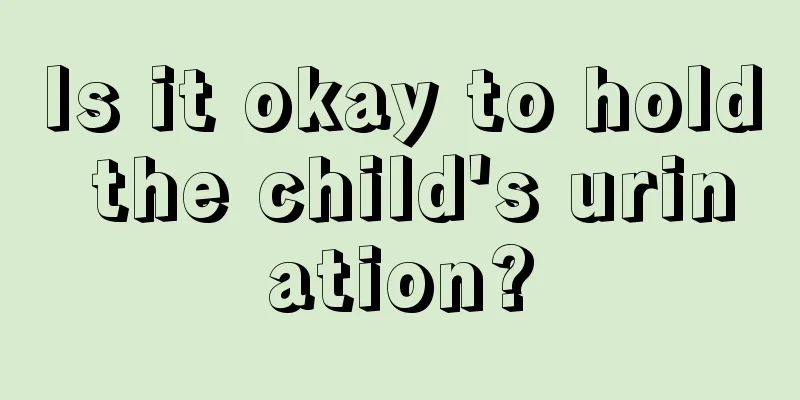Baby allergy red spots

|
Many parents do not want to see their babies have many small red spots on their bodies due to skin allergies. This will make the children feel very itchy and uncomfortable, and the parents will also be very anxious. The causes of baby allergies include respiratory virus infection, chemical drug stimulation, environmental factors or personal factors, etc., so corresponding care work needs to be done and examinations must be done. Causes of allergies in babies The triggers of allergic reactions generally fall into two categories: 1. Direct factors: including allergens, respiratory viral infections, chemical irritants such as cigarette nicotine, car exhaust, ozone, etc. These factors can directly induce allergic symptoms. 2. Indirect factors: such as exercise, drastic weather changes, temperature difference between indoor and outdoor greater than 7°C, drinking ice water, emotional instability, etc. These factors can cause contraction of organs that already have allergic inflammation, such as the bronchi. Common inhalation allergens include household dust, dust mites, feathers, cat dander, dog dander, fungi, cockroaches, and pollen; food allergens include: milk, eggs, peanuts, nuts, soybeans and soy products, wheat, crabs, shrimps, cod, clams, and other seafood. The most common of these allergens is household dust mites. Baby skin care products can also cause baby allergies. The first mouthful of milk is the most important to prevent baby allergies. What to do if your baby has allergies If your child has recurring coughs and runny noses and is suspected to have allergies, how should parents respond? 1. Take your child to see an allergy specialist at least once (some hospitals have allergy or asthma specialists): the specialist's examination is very meaningful for a clear diagnosis. Parents should pay attention to the timing of the visit: (1) Cough, especially when accompanied by an asthma attack but without fever. (2) Persistent runny nose and cough for more than 2 weeks, especially when multiple antibiotics have been used with no effective results. 2. Parents should carefully observe each time their child has an attack: It is best to keep detailed records, which will help you find the cause (allergen). The key points of observation include: (1) Where do symptoms get worse, outdoors or at home? Tips: Severe symptoms outdoors are often caused by pollen allergies. This type of pollen mostly comes from wind-pollinated plants. This type of flower is small and not bright, so it is not conspicuous. It is recommended that these children play in places with few trees, preferably close to the water, such as riverbanks and beaches. Reduce outdoor activities during the windy and flowering season. Children with more severe symptoms at home may be allergic to house dust mites. Pay attention to indoor ventilation, mop the floor and wipe the furniture frequently in the dry season, and wash the filter frequently when using air conditioners. |
<<: There is a hard lump on the newborn's neck
>>: Newborn baby has not gained weight in 15 days
Recommend
Can simple purpura in children be cured?
The reason why many parents nowadays do not like ...
What should I do if my baby is infected with Mycoplasma pneumoniae?
Some babies suffer from serious lung diseases. On...
How should appendicitis in children be diagnosed?
Generally, children will have stomach pain. At th...
Which department should I go to for phimosis surgery on my child?
It is a very common phenomenon for children to ha...
What to do if your baby has an irregular heartbeat
When every baby comes into the world, parents are...
When is the best time for children to have their teeth straightened?
Many children have many problems with their teeth...
Two-year-old baby suddenly cried in the middle of the night
It is a very common phenomenon for babies to cry ...
Baby cough and asthma massage
Cough and asthma is a common disease among babies...
Six month old baby cannot sit steadily
Six-month-old babies’ bodies are growing rapidly ...
What should I do if my newborn baby has a bad stomach?
We all know that the gastrointestinal digestion a...
What causes rheumatoid arthritis in children?
In today's life, no matter what disease it is...
What should I do if my baby's lips are swollen?
When we were young, we were inevitably naughty an...
What to do if a child has warts on his face
If you accidentally find that your child has wart...
How to treat atrial septal defect in newborns
Atrial septal defect in newborns is a congenital ...
What is the reason for redness in children's genitals
Many children will have some redness and swelling...









